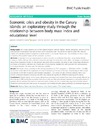Identificador persistente para citar o vincular este elemento:
https://accedacris.ulpgc.es/jspui/handle/10553/60147
| Título: | Economic crisis and obesity in the Canary Islands: an exploratory study through the relationship between body mass index and educational level | Autores/as: | Hernández-Yumar, Aránzazu Abásolo Alessón, Ignacio González López-Valcárcel, Beatriz |
Clasificación UNESCO: | 531207 Sanidad | Palabras clave: | Obesity Body mass index Economic crisis Social gradient Canary Islands |
Fecha de publicación: | 2019 | Publicación seriada: | BMC Public Health | Resumen: | Background: The Canary Islands is one of the Spanish Regions with the highest obesity prevalence, and one of the Autonomous Communities that was hit hard by the economic crisis that arrived to Spain in 2008. This research studies the education-related inequalities in adult obesity in the Canary Islands and their evolution in recent years, considering the possible impact of the economic recession.Methods: A repeated cross-sectional analysis is carried out with data obtained from the Canary Islands Health Surveys of 2004, 2009 and 2015. Obesity is measured through the body mass index (BMI). The analysis is performed using linear regression models for the general population and by gender, adjusting by age, educational attainment and island of residence. Likewise, the models also include dummy variables for each year and the corresponding interactions between the years and the education variable.Results: The results show a decrease in the obesity prevalence in 2015 compared to 2009 (from 19.54 to 18.64%). An increase in the BMI of the population and that of women (+ 0.33 and + 0.59 units, respectively) in 2009, as well as a decline in the BMI of women with medium education (- 0.21 units) are also observed. Besides, there is an inverse correlation between education and BMI, and statistically significant differences among some islands.Conclusions: Obesity figures in the Canary Islands have decreased and women have been more greatly affected by the changes in BMI during the economic crisis. Due to the fact that educational attainment is a protective factor in general (and for women with medium education levels in times of crisis, in particular), regional authorities should implement actions that promote access to education and healthy lifestyles, paying attention to territorial disparities. | URI: | https://accedacris.ulpgc.es/handle/10553/60147 | ISSN: | 1471-2458 | DOI: | 10.1186/s12889-019-8098-x | Fuente: | BMC public health [ISSN 1471-2458], v. 19, p. 1755 |
| Colección: | Artículos |
Citas SCOPUSTM
8
actualizado el 08-jun-2025
Citas de WEB OF SCIENCETM
Citations
6
actualizado el 08-feb-2026
Visitas
315
actualizado el 15-ene-2026
Descargas
171
actualizado el 15-ene-2026
Google ScholarTM
Verifica
Altmetric
Comparte
Exporta metadatos
Los elementos en ULPGC accedaCRIS están protegidos por derechos de autor con todos los derechos reservados, a menos que se indique lo contrario.
